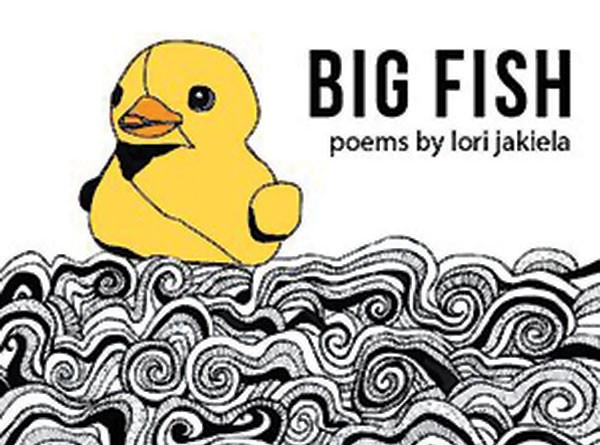The entirety of “Tired,” the first poem in Lori Jakiela’s new chapbook Big Fish (Stranded Oak Press), reads: “I’m barely afraid of spiders anymore.” Brevity notwithstanding, it’s revealing in ways that the Trafford native and acclaimed memoirist develops more fully over 36 extremely readable pages, many concerning her speaker turning 50.
The title poem riffs on Pittsburgh’s reputation for oversized Lenten fish sandwiches, beginning with, “A pink-haired punk kid rocks the fryer / at Keith Heinritz’s Catering” and ends with Jakiela writing, “The punk rock kid is beautiful. The most beautiful thing. / His hair is a poppy blossom in the thick gray light.” In between, Jakiela quotes Samuel Beckett and Dee Snider, offers a scene of her parents lovingly sharing take-out, and refers to a large rubber duck as “the magic in our rivers.” It’s a stunning series of images that in lesser hands might’ve become discordant.
Like much of Jakiela’s work, her strong voice cuts through. There’s tenderness to be found in “Incisions,” laughter when she drops that “I know how to Dougie, Whip and NaeNae,” and a touching sweetness in “One Day When He Was Dying.” However it’s sliced, Big Fish showcases Jakiela’s easy wit softening life’s harder edges.
Another chapbook, When I Loved You (Finishing Line Press), by Oakland resident Judith Robinson, moves in more impressionistic ways, such as when she writes in the title poem: “Dream a bend in the mind / a boomerang that hits back / with unimaginable evidence / every other brain must reject.” The work in this 27-page collection veers from the philosophical and opaque to more narrative pieces like “Pittsburgh, 1985.”
Robinson is at her best when rendering the place and details of her speaker’s world, as in “Heaven”: “The best day of my life / Took place near Ligonier / During a summer long ago / When my husband and all my children / Were still alive.” There’s no conflict here needing resolution, only “a blessed normalcy” that the speaker wishes to recapture. It’s also a moving reminder to be grateful for life’s small moments.
The poem “another thing” continues Robinson’s examination of the transitory nature of experience, describing creative inspiration as “… this bright / red thing that jiggles / and giggles,” ending up “under the old couch / … where it often goes to sleep.” This playfulness highlights what works best in the striving When I Loved You.















